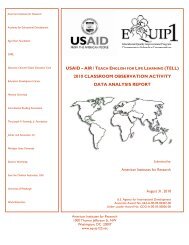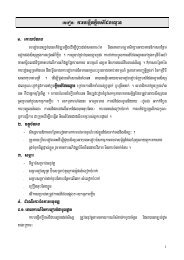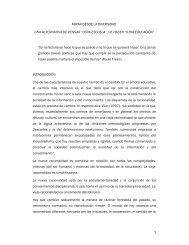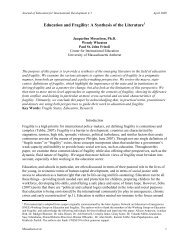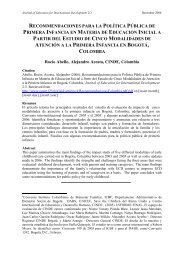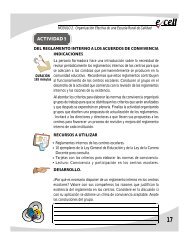The Power of Persistence: Education System ... - EQUIP123.net
The Power of Persistence: Education System ... - EQUIP123.net
The Power of Persistence: Education System ... - EQUIP123.net
You also want an ePaper? Increase the reach of your titles
YUMPU automatically turns print PDFs into web optimized ePapers that Google loves.
Sustainability in the context <strong>of</strong> system reform is more complex and subtle than<br />
simple continuation <strong>of</strong> project activities or initiatives. Sustaining change and<br />
activities requires an alignment between institutional leadership and ownership<br />
by the people involved, supported by policies and procedures that reinforce<br />
behavior and provide incentives for commitment over time and across political<br />
loyalties. Sustainability requires system reforms to survive changes in leadership<br />
at all levels. Sustainability must be balanced with two other elements—change<br />
and continuous improvement. In the context <strong>of</strong> the long term case studies,<br />
it appears that the most important focus in pursuit <strong>of</strong> sustainability is not on<br />
specific project activities, but rather on developing and continuing mature and<br />
effective systems <strong>of</strong> management, decision making, and governance. While<br />
financial sustainability is also necessary, this study finds that addressing the<br />
funding gap alone will not lead to sustainable change.<br />
Scaling Up. requires that other components <strong>of</strong> reform be successfully addressed—<br />
that the changes have been introduced in sufficient depth as to have genuine<br />
ownership and leadership at all levels; that the interventions and policies have<br />
proven to be effective; and that the reforms are sustainable over time and<br />
conditions. When all <strong>of</strong> these conditions are in place, scaling up is possible, but<br />
remains one <strong>of</strong> the greatest challenges, requiring both patience and persistence.<br />
Several countries in this study have made significant progress in adopting<br />
processes and principles on a national scale. <strong>The</strong> key factors for success have<br />
been continuity, adaptation, and time. In none <strong>of</strong> the cases, however, are<br />
specific reforms operating at acceptable quality standards on a national scale.<br />
In the rush to scale up in a ‘cost-effective’ way, there is a tendency to look for a<br />
formula, instead <strong>of</strong> recognizing that the human process <strong>of</strong> developing ownership,<br />
strengthening new behaviors, and changing systems is done at province-byprovince,<br />
district-by-district, and school-by-school levels. <strong>The</strong> substantive<br />
reforms that affect teacher and student behavior require not simply new<br />
knowledge, but rather reculturing, as has been pointed out by Michael Fullan,<br />
and reinforced by these case studies.<br />
EXECUTIVE SUMMARY 7



